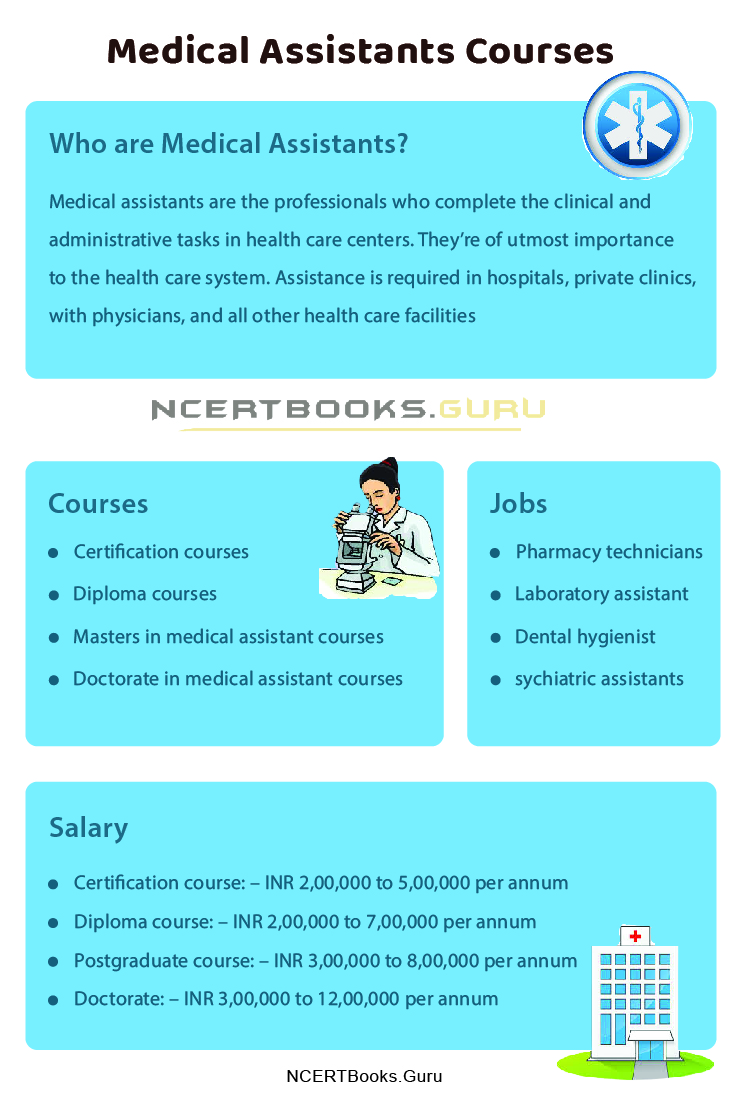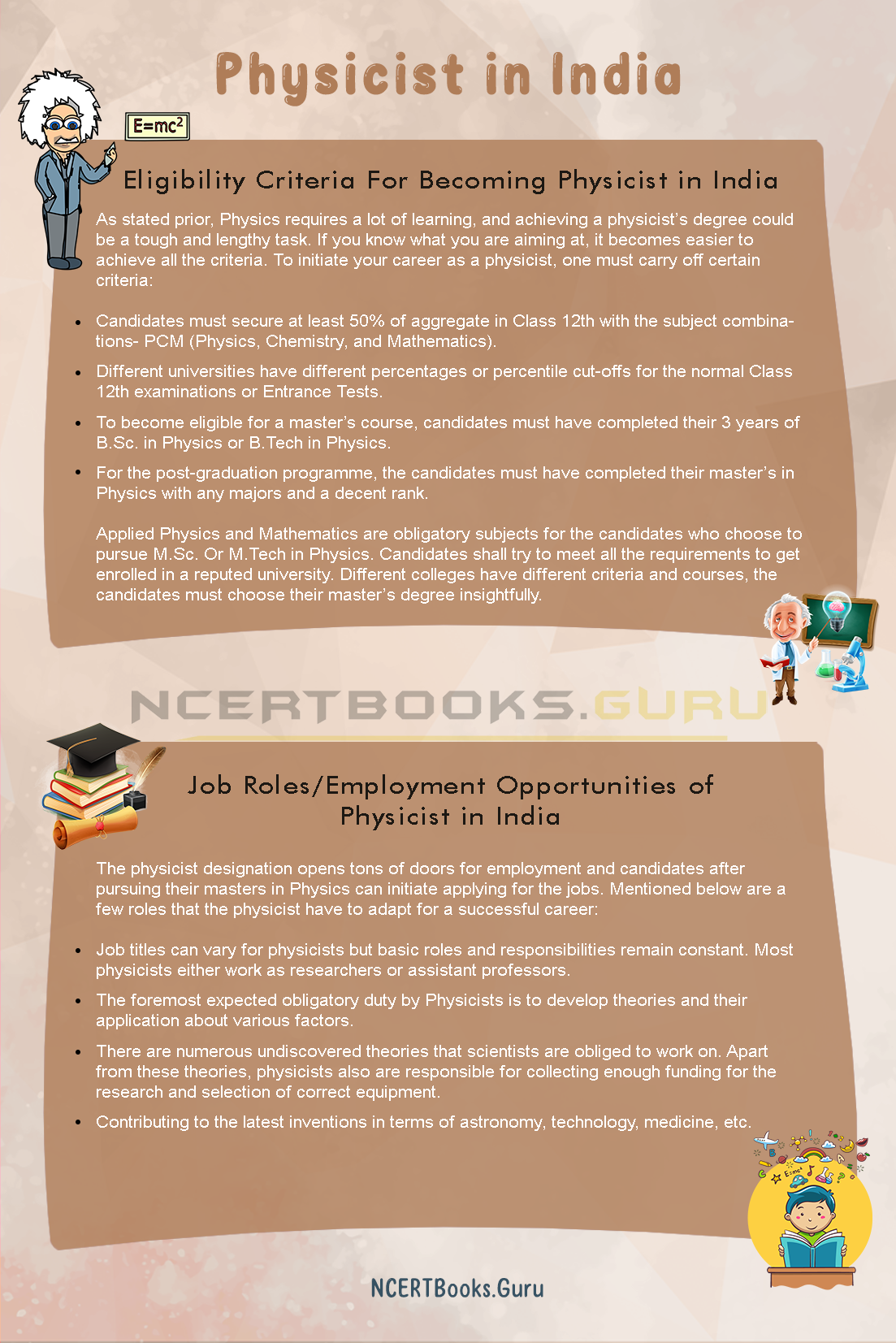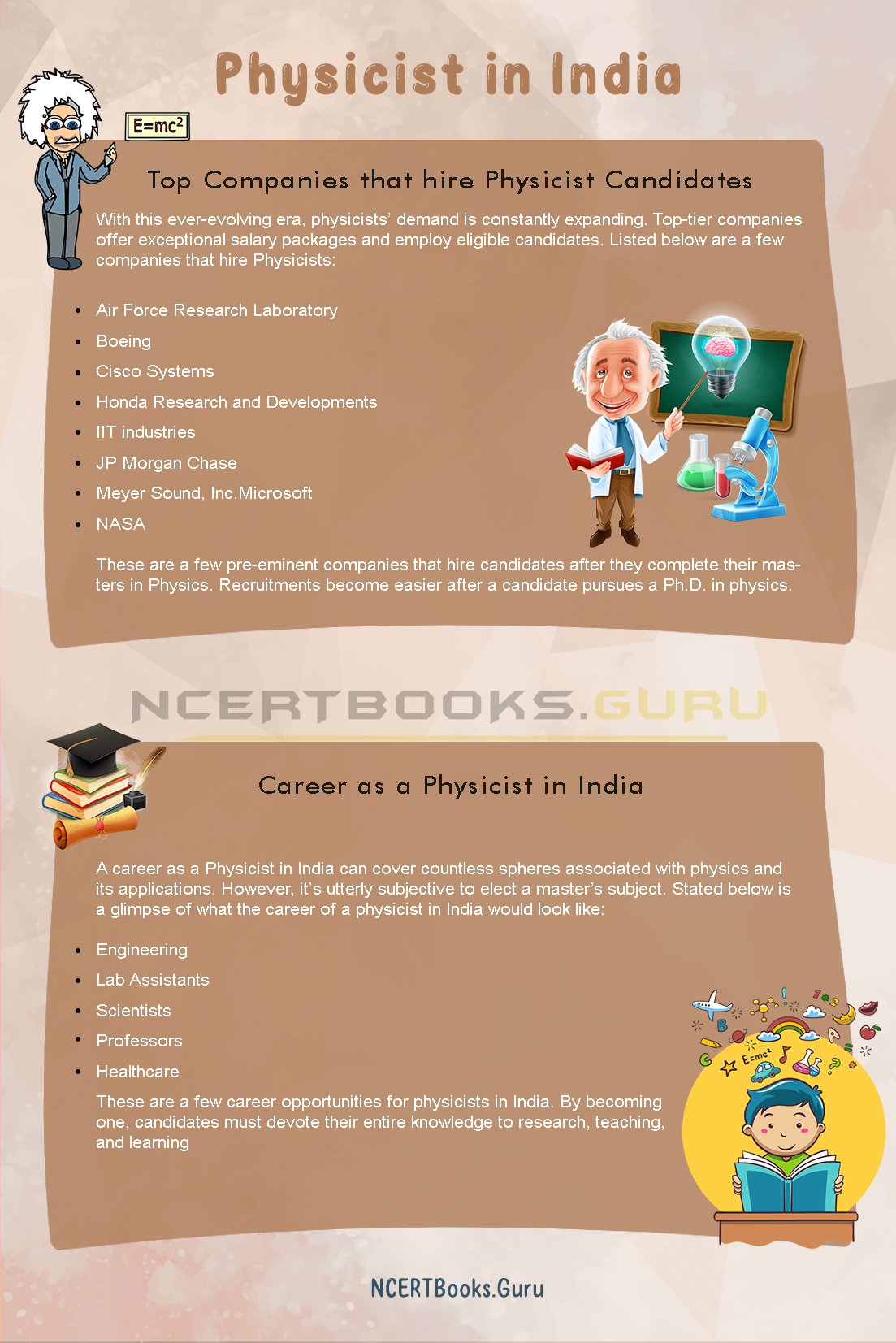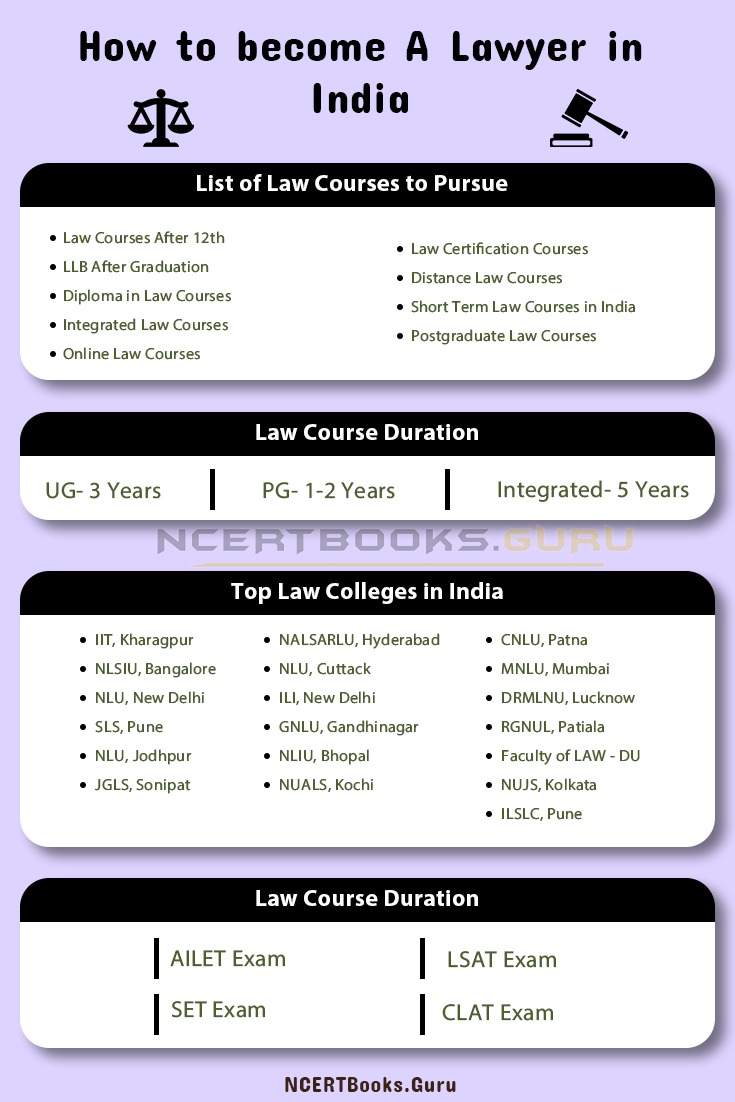Courses for Medical Assistants: Medicine is one of the most respected and popular fields of work. There is a huge demand each year for highly skilled medical professionals and one of the work posts with a high requirement is that of a medical assistant.
Let’s get to know who is a medical assistant, what courses are available for the candidates who wish to become one, and various other factors that one needs to know about medical assistant courses. To know more about this specific medical assistant course details, keep reading!
- Who are Medical Assistants?
- Types of Courses for Medical Assistants
- Medical Assistant Course Eligibility Criteria
- How to Get Admission in Medical Assistant Courses?
- Medical Assistant Course Fees
- Top Institutes for Medical Assistant Course India
- Job Opportunities After Completing Medical Assistant Course Online / Offline
- Salary for Certified Medical Assistants
- FAQs Regarding Courses for Medical Assistants in India
Who are Medical Assistants?
Medical assistants are the professionals who complete the clinical and administrative tasks in health care centers. They’re of utmost importance to the health care system. Assistance is required in hospitals, private clinics, with physicians, and all other health care facilities.
Hence, medical assistants have a huge role and are found everywhere in the healthcare industry. They basically help the physicians with examinations of patients, record the patient’s personal information, schedule appointments for patients, and prepare all the samples such as urine samples, and blood samples for laboratory tests.
Do Check:
Types of Courses for Medical Assistants
In order to become a medical assistant, you will have to pursue one of the many types of courses available. Courses for becoming a medical assistant are offered at the undergraduate, postgraduate diploma, and doctorate levels.
There are also multiple certification level courses offered by multiple colleges in offline and online modes as well. Let’s look at the different types of courses that are available for medical assistant study in detail:
- Certification courses: Multiple Indian institutes and foreign universities offer certification programs for the study of medical assistants. Some of the courses that are available in the certification format are the home health assistant course, duty assistant course, nurse assistant course, etc. Certification courses can be pursued in a full-time or a part-time manner.
- Undergraduate level medical assistant courses: The duration of these courses is 4 years and it is full-time medical assistant courses which include physician assistant, and BSc in nursing courses students can pursue this course after they have completed their class 12th in the science stream. Undergraduate courses can be pursued in a full-time regular or full-time distance manner.
- Diploma courses: Medical assistant courses are also available in the diploma court format and the top diploma in postgraduate diploma courses in India for medical assistance include a diploma in medical assistance and advanced post-diploma in physician assistant courses. Undergraduate diploma courses can be pursued in a full-time or part-time manner.
- Masters in medical assistant courses: Masters medical assistant courses include physician assistant and advanced postgraduate courses. A lot of these courses are also offered in online mode by multiple colleges. The master’s courses can be pursued in a full-time regular or full-time distance manner.
- Doctorate in medical assistant courses: Candidates can reach new heights in their professional career in the medical field such as in primary care, emergency medicine, hospital medicine, and many more by doing a doctorate in medical assistant courses. Various universities offer Ph.D. courses to candidates that can help them boost their careers. doctorate courses can be pursued in a full-time regular or full-time distance manner.
Medical Assistant Course Eligibility Criteria
The eligibility criteria for different types of courses for medical assistant studies are different. So let’s look at each of the different sets of eligibility criteria for different types of courses:
- Certification courses: The candidate will be eligible only if they have a graduation degree from a recognized board.
- Diploma courses: Aspirants will be eligible if they have passed their class 10th or 12th from a recognized Board of Education with a minimum of 50% marks or have completed their graduation from a recognized board.
- Undergraduate courses: A candidate will be eligible if they have completed their class 12th from a recognized Board of Education with a minimum of 50% marks.
- Postgraduate courses: For postgraduate courses, candidates will only be eligible if they have completed their graduation from a recognized board completing internships will be a plus point for the admission process.
- Doctorate: For doctorate courses, the candidate will be eligible if they have a master’s degree in Health Science or an equivalent postgraduate course from a recognized university. They must also have a minimum of 50% marks in their master’s degree.
How to Get Admission in Medical Assistant Courses?
To get admitted to a medical assistant course, the first step is ensuring that you clear all the eligibility criteria. Above are all the eligibility criteria mentioned for different types of courses such as certification courses, diploma courses, undergraduate courses, postgraduate courses, and doctorate courses.
You must ensure that whatever course you’re going for, you clear the eligibility criteria before applying. After that, you must follow the following procedure in order to get admitted to your preferred college:
- Take the entrance test required in order to take admission to medical assistant courses. For taking the test, you must visit the official website of the body that conducts the test and register yourself for it. After that, you must download the admit card whenever it is available and take the test on the date declared.
- After the result of the test is declared, you must choose your institute on the basis of the marks obtained and apply for it. If your application is selected, you will be called in for counseling.
- In case there is a rule that you want to get admitted to conducting its own entrance exam, you must have already taken that test and cleared it only then will you be allowed to proceed with the application process.
- After that, if you get selected in the counseling and interview round, your seat will be confirmed in the college but only after the submission of some amount of fees. For this, you will have to visit the college admission cell and submit the fee hence booking your seat in that college.
- A step that will keep you ahead is checking the website of the college since you will be getting regular updates about the admission process and will stay updated.
Medical Assistant Course Fees
The fee structure for all courses of medical assistant studies is different. Let’s look at the fee structure of all the types of medical assistant courses:
- Certification courses – INR 5,000 to INR 3,00,000 for the entire course
- Diploma courses – INR 50,000 to INR 1,50,000 for the entire course
- Undergraduate courses – INR 1,50,000 to INR 5,00,000 for the entire course
- Postgraduate courses – INR 30,000 to NR 2,00,000 for the entire course
- Doctorate – INR 10,000 to INR 2,00,000 for the entire course
Must Check:
Top Institutes for Medical Assistant Course India
There are multiple institutes all across the country which provide education medical assistant courses please stop let’s look at the top institutes for medical assistant courses in India for various kinds of courses such as certification courses, diploma courses, bachelor courses, masters courses, and doctorate courses:
Top Colleges for certification courses in medical assistant courses:
- Global Institute of Health Management
- Tech Mahindra Smart Academy for Healthcare
- Shankar Netralaya Academy
- US Career Institute
- Care one health Training Institute
- Indira Gandhi National Open University
- Global Institute of Health management
- IGNOU, and many more.
Best institutes for diploma in medical assistant course:
- Indira Gandhi National Open University
- Sumandeep Vidyapeeth
- Krishna Institute of Medical Sciences
- Pondicherry University Community College
- Institute of Public Health and Hygiene
- Delhi Paramedical and Management Institute
- Saint Francis College for Women
Top colleges for undergraduate courses in medical assistant:
- AIIMS New Delhi
- Apollo Institute of Hospital Management and Allied Sciences
- DY Patil University
- PGIMER Chandigarh
- CMC Vellore
- Christian Medical College
- Sri Ramchandra University
- Shri Balaji Vidyapeeth University
Best Colleges for masters’ in medical assistant courses:
- Amrita Institute of Medical Science and Research Center
- St. Francis College for Women
- Amrita Vishwa Vidyapeetham University
Top institutes for doctorate medical assistant courses:
- Noida International University
- SIMAT
- Aarupadai Institute of Technology
- SPPU
Job Opportunities After Completing Medical Assistant Course Online / Offline
A course in medical assistant studies provides a candidate with multiple career robot journeys in the future. Student can begin their medical journey from here and expand their knowledge and work area to different medical fields. Following are some of the top job prospects for students with a degree in medical assistance:
- Pharmacy technicians
- Physical therapist assistant
- Laboratory assistant
- Dental hygienist
- Psychiatric assistants, etc.

Salary for Certified Medical Assistants
The average starting salary that a candidate can expect after they have completed their medical assistant courses is somewhere between INR 2,00,000 to INR 8,00,000 per annum. However, different degrees result in different salary packages. Let’s look at the different types of degrees and their average salary packages:
- Certification course: – INR 2,00,000 to 5,00,000 per annum
- Diploma course: – INR 2,00,000 to 7,00,000 per annum
- Undergraduate bachelor’s course: – INR 3,00,000 to 8,00,000 per annum
- Postgraduate course: – INR 3,00,000 to 8,00,000 per annum
- Doctorate: – INR 3,00,000 to 12,00,000 per annum
FAQs Regarding Courses for Medical Assistants in India
1. Is doing a medical assistant course worth it in India?
The worth of a course completely depends upon the candidate pursuing the course and how they use it in the future. So, if you’re passionate about dealing with people and helping them and want to contribute to the health care system, you will be a very good fit for a medical assistant course in India. Even if you want to switch careers, you can definitely do it after a medical assistant course. Also, at the present time with advancements in the medical field cover medical assistance are in great demand hence this is a very good career option for recent times.
2. Can I do a medical assistant course after 12th?
Yes, you can definitely do medical assistant courses after completing your class 12:00 o’clock you can either go for certification courses or diploma courses for undergraduate bachelor courses. The eligibility for all these 3 types of courses that you must have completed your class 12th from a recognized Board of Education with a minimum of 50% Marks and you must have a science stream in your class 12 board examinations.
3. What is the salary that I can expect after completing a diploma in medical assistant course?
After completing the diplomas in medical assisting in 2022, you can expect a salary of somewhere between INR 2,00,000 per annum to INR 8,00,000 per annum stop it completely depends upon the company with which you are working, the job position in which you are working, the years of experience that you have, and definitely your skillset.
Conclusion
We hope that we have clarified all your queries regarding medical assistant courses in India. The above article contains in detail, all the available courses for medical assistant studies. The details of medical assistant certification courses, diploma courses, undergraduate courses, postgraduate courses, and doctorate courses are given under various headings throughout the article.
Do let us know what you felt about this article and if you have any suggestions let us know in the comment section. Continue referring to our articles to know more about various other course details and do give us your valuable feedback. Also, we are hoping that you will make an informed decision for yourself after checking out the above details on Courses for Medical Assistants, All the best!












